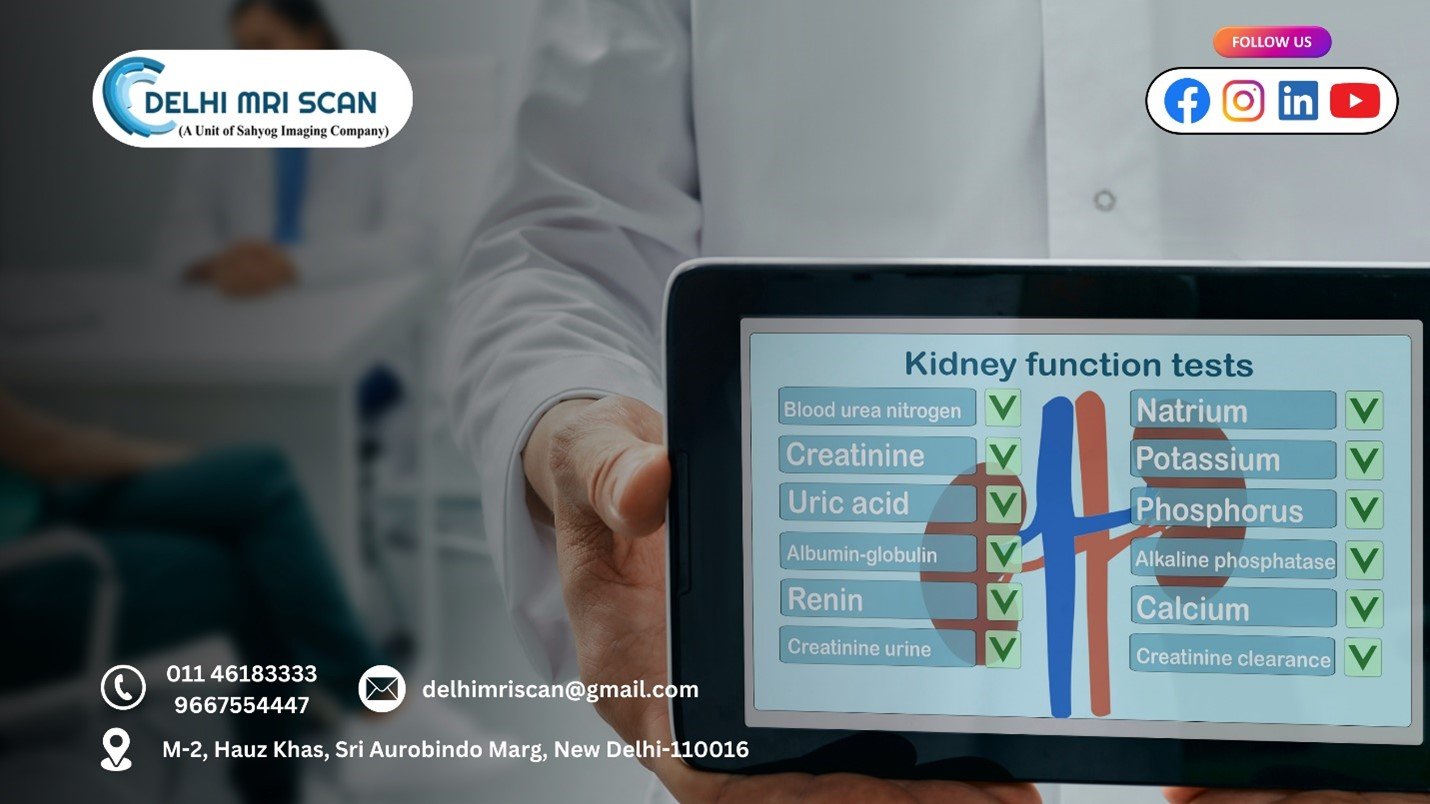Nov 18, 2024
Protect Your Kidneys: Insights into the Kidney Function Test (KFT)
The kidneys are vital organs that play a crucial role in maintaining overall health. They filter waste products from the blood, regulate electrolyte balance, control blood pressure, and produce hormones essential for red blood cell production and bone health. Regular monitoring of kidney health is crucial, particularly for individuals at risk of kidney disease. The Kidney Function Test (KFT) is one of the primary tools used for this purpose.
If you're looking for the Best KFT Test in Hauz Khas, visit Delhi MRI Scan, where state-of-the-art diagnostics meet expert care.
What is a Kidney Function Test (KFT)?
A Kidney Function Test (KFT) is a series of blood and urine tests that evaluate kidney performance. It helps determine the kidneys' ability to filter waste, balance fluids, and regulate essential electrolytes. Key components include:
- Serum Creatinine: This test measures the level of creatinine, a waste product produced by muscle metabolism, in the blood. Elevated levels of creatinine can indicate impaired kidney function.
- Blood Urea Nitrogen (BUN): This test measures the amount of nitrogen in the blood that comes from urea, a waste product formed in the liver. High BUN levels can suggest kidney dysfunction or dehydration.
- Glomerular Filtration Rate (GFR): The GFR is a calculated value that estimates how well the kidneys are filtering blood. It is derived from the serum creatinine level, age, sex, and race. A GFR below 60 mL/min/1.73 m² may indicate chronic kidney disease (CKD).
- Urinalysis: This test examines the urine for the presence of protein, blood, glucose, and other substances. The presence of protein (proteinuria) can be an early sign of kidney damage.
- Electrolyte Levels: Tests for electrolytes such as sodium, potassium, calcium, and phosphate help assess the kidneys' ability to maintain a proper balance of these essential minerals.
For accurate and reliable results, choose the Best KFT Test in Hauz Khas at Delhi MRI Scan.
Why is a KFT Important?
Regular kidney function tests are essential for several reasons:
- Early Detection of Kidney Disease: Many people with kidney disease do not experience symptoms until the condition is advanced. A KFT can help detect kidney problems early, allowing for timely intervention and management.
- Monitoring Existing Conditions: For individuals with known risk factors for kidney disease, such as diabetes, hypertension, or a family history of kidney problems, regular KFTs can help monitor kidney function and adjust treatment plans as needed.
- Assessing Medication Effects: Certain medications can affect kidney function. Regular KFTs can help healthcare providers monitor the impact of these medications and make necessary adjustments.
- Evaluating Overall Health: Kidney function is closely linked to overall health. A KFT can provide valuable insights into your body’s metabolic processes and help identify potential health issues.
Get the Best KFT Test in Hauz Khas by visiting Delhi MRI Scan for comprehensive kidney health analysis.
Who Should Get a KFT?
While anyone can benefit from a KFT, certain individuals are at higher risk for kidney disease and should consider regular testing:
- Diabetics: High blood sugar levels can damage the kidneys over time, making regular monitoring essential.
- Individuals with High Blood Pressure: Hypertension can lead to kidney damage, so monitoring kidney function is crucial for those with this condition.
- People with a Family History of Kidney Disease: Genetics can play a significant role in kidney health, so those with a family history should be vigilant.
- Older Adults: Kidney function naturally declines with age, making regular testing important for older adults.
- Individuals with Heart Disease: There is a strong link between heart health and kidney function, so those with cardiovascular issues should be monitored.
At Delhi MRI Scan, the Best KFT Test in Hauz Khas ensures accurate, timely diagnoses to help you stay proactive about your kidney health.
Understanding KFT Results
Once the tests are completed, your healthcare provider will review the results and explain what they mean. Here’s a breakdown of the key components of the KFT and what the results may indicate:
1. Serum Creatinine Levels
- Normal Range: Typically, normal serum creatinine levels range from about 0.6 to 1.2 mg/dL for adults, but this can vary based on factors such as age, sex, and muscle mass.
- Elevated Levels: Higher levels of creatinine may indicate impaired kidney function. This could be due to acute kidney injury, chronic kidney disease, or other conditions affecting the kidneys.
2. Blood Urea Nitrogen (BUN)
- Normal Range: Normal BUN levels usually range from 7 to 20 mg/dL.
- Elevated Levels: Increased BUN levels can suggest kidney dysfunction, dehydration, or excessive protein intake. It’s important to interpret BUN levels in conjunction with creatinine levels for a more accurate assessment of kidney function.
3. Glomerular Filtration Rate (GFR)
- Normal Range: A GFR of 90 mL/min/1.73 m² or higher is generally considered normal. A GFR below 60 mL/min/1.73 m² for three months or more may indicate chronic kidney disease.
- Stages of CKD: The GFR is used to classify the stages of chronic kidney disease:
- Stage 1: GFR ≥ 90 (normal or high)
- Stage 2: GFR 60-89 (mild decrease)
- Stage 3: GFR 30-59 (moderate decrease)
- Stage 4: GFR 15-29 (severe decrease)
- Stage 5: GFR < 15 (kidney failure)
4. Urinalysis
- Protein Levels: The presence of protein in the urine (proteinuria) can indicate kidney damage. Normal urine should have little to no protein.
- Blood in Urine: Hematuria, or blood in the urine, can be a sign of various conditions, including kidney stones, infections, or more serious kidney issues.
- Other Substances: The urinalysis may also check for glucose, ketones, and other substances that can provide additional insights into your overall health.
5. Electrolyte Levels
- Sodium, Potassium, Calcium, and Phosphate: Abnormal levels of these electrolytes can indicate how well the kidneys are regulating them. For example, high potassium levels (hyperkalemia) can be dangerous and may require immediate attention.
What Happens Next?
If your KFT results indicate impaired kidney function or other abnormalities, your healthcare provider may recommend further testing or a referral to a nephrologist (a kidney specialist). Here are some potential next steps:
- Additional Testing: Further tests may include imaging studies (like ultrasounds or CT scans) to visualize the kidneys or kidney biopsies to assess the underlying cause of kidney dysfunction.
- Lifestyle Modifications: Depending on the results, your doctor may suggest lifestyle changes, such as dietary modifications, increased hydration, or weight management, to help support kidney health.
- Medication Adjustments: If you are taking medications that may affect kidney function, your doctor may adjust dosages or switch to alternative treatments.
- Regular Monitoring: If you have chronic kidney disease or are at risk, your healthcare provider may recommend regular KFTs to monitor your kidney function over time.
- Referral to a Specialist: If significant kidney issues are detected, you may be referred to a nephrologist for specialized care and management.
For a seamless experience and accurate testing, trust Delhi MRI Scan for the Best KFT Test in Hauz Khas.
Overall Summary
A Kidney Function Test (KFT) is an invaluable tool for assessing kidney health, detecting potential issues, and guiding early intervention. Regular testing is particularly important for individuals with risk factors such as diabetes, hypertension, or a family history of kidney problems.
For the Best KFT Test in Hauz Khas, visit Delhi MRI Scan—your partner in ensuring optimal kidney health and well-being. Take charge of your health today with precise, reliable diagnostic services!






